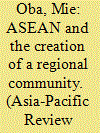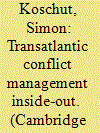| Srl | Item |
| 1 |
ID:
131848


|
|
|
|
|
| Publication |
2014.
|
| Summary/Abstract |
After the ASEAN Concord II called for the building of an ASEAN Community in 2003, the creation of an ASEAN Community became a concrete part of the political agenda for the nations of Southeast Asia, and an ASEAN Community is scheduled to be created in 2015. However, it will all be for naught if the ASEAN Community that is established does not truly contribute to the stability and prosperity of the region. From this point of view, the article will attempt to evaluate the development of an ASEAN community concept and efforts to create it. To clarify the ideal of a true community, this article will take up Karl Deutsch's concept of "pluralistic security communities" and reconsider what a community requires. The article will state that the efforts to create an ASEAN Community should not be underestimated, and the blueprints for the creation of the ASEAN Community outline the formation of a true regional community. It will, however, conclude that in reality there exist factors within the ASEAN region that may shake the development of an ASEAN Community. It has to be said that the fostering of a sense of community at the level of ordinary people, as well as the creation of a community in which fundamental values and norms are shared, are distant propositions.
|
|
|
|
|
|
|
|
|
|
|
|
|
|
|
|
| 2 |
ID:
132055


|
|
|
|
|
| Publication |
2014.
|
| Summary/Abstract |
This article explores the impact of domestic norms on regional security practices in a pluralistic security community in the transatlantic area. A security community is considered to be 'a group which has become integrated, where integration is defined as the attainment of a sense of community, accompanied by formal or informal institutions or practices, sufficiently strong and widespread to assure peaceful change among members of a group with "reasonable" certainty over a "long" period of time' (Karl W Deutsch, Sidney A Burrell, Robert A Kann, Maurice Lee Jr, Martin Lichterman, Raymond E Lindgren, Francis L Loewenheim and Richard W Van Wagenen (1957) Political community and the North Atlantic area: international organization in the light of historical experience (Princeton, New Jersey: Princeton University Press)). Recent studies have aligned the concept of security community with the practice turn in International Relations theory. Although practice theory is able to explain peaceful conflict resolution within a security community, this article shows that its explanatory power is significantly weaker when it comes to military interventions outside the security community. The article theoretically and empirically investigates this argument by using the empirical case of extraregional conflict management in Afghanistan. The importance of domestic norms in constructing and perceiving regional security practices in out-of-area operations emphasizes the 'local' over the 'regional' as a crucial driver behind the emergence of a regional actor's understanding of security and thus for the formation and consolidation of regional peace.
|
|
|
|
|
|
|
|
|
|
|
|
|
|
|
|